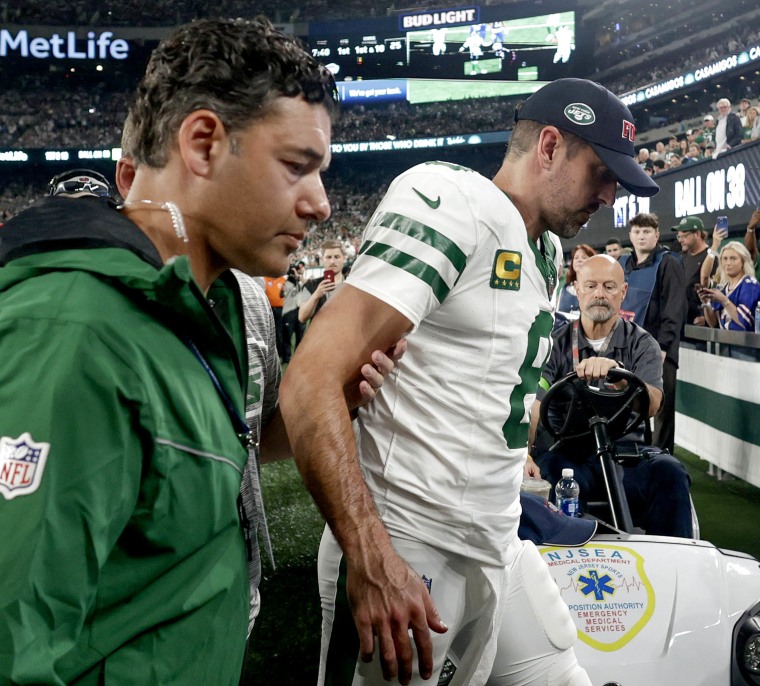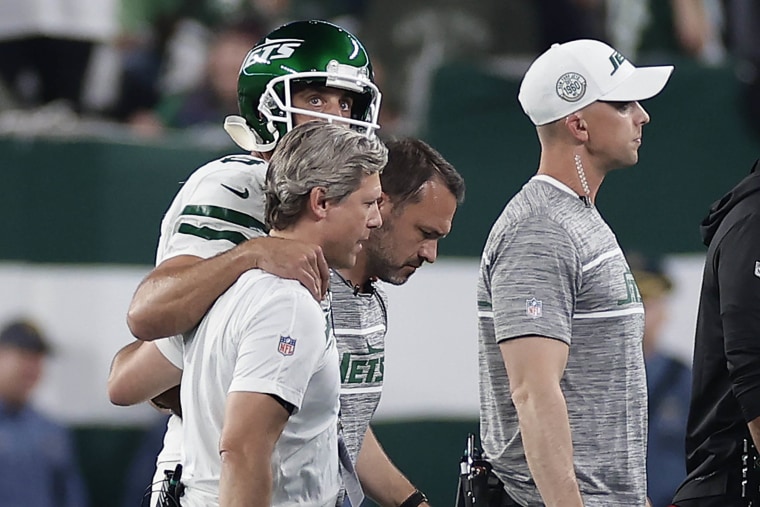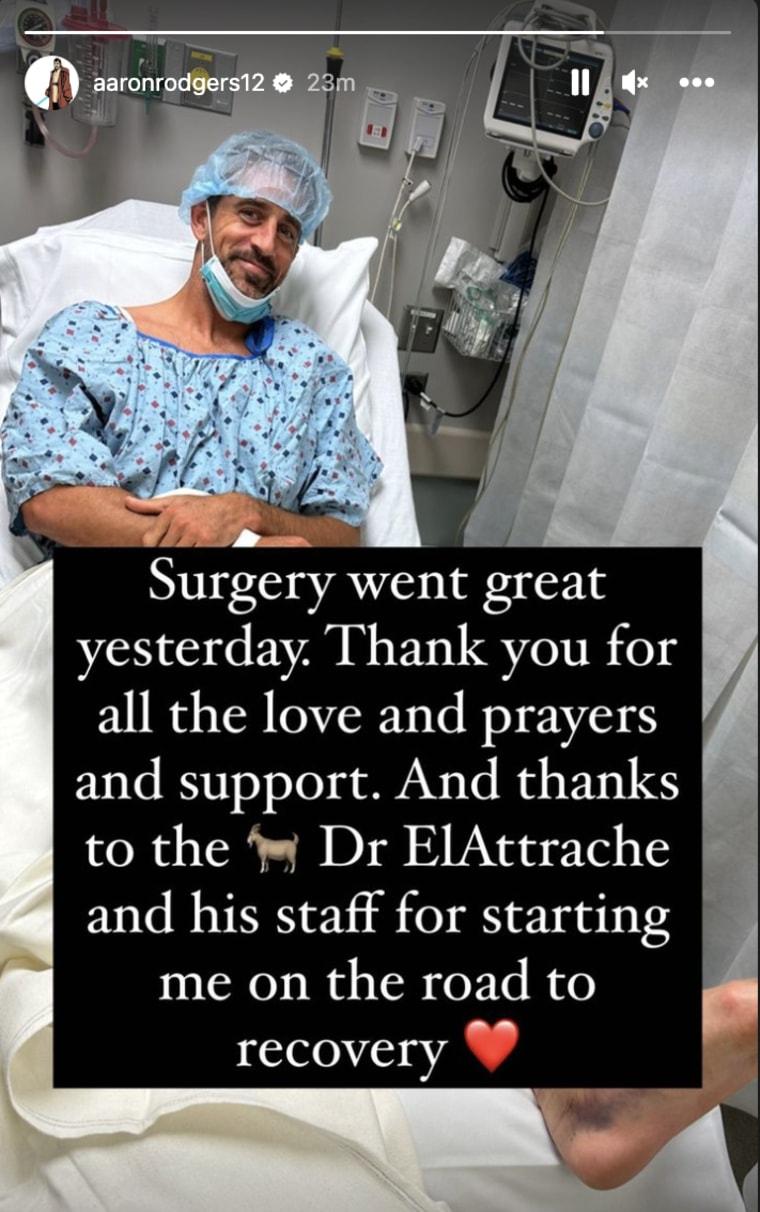Could Aaron Rodgers return to the playing field this season?
The four-time NFL MVP quarterback teased that very idea during an appearance on ESPN’s “The Pat McAfee Show” on Sept. 15.
When asked about the timetable for his return, Rodgers said he had thought about the possibility of playing again this season, potentially in the playoffs, should the Jets qualify for the postseason.
“I’m not going to make any of those statements. I don’t feel like that’s fair to myself,” he said.
When pressed on the idea, though, Rodgers invoked the words of an NBA legend.
“I think, as Kevin Garnett said, anything’s possible,” he said, referring to Garnett’s reaction after he won the NBA championship with the Boston Celtics in 2008.
“It doesn’t do anything to make prognostications, honestly, other than help my own personal state, you know? But, yeah, I’m going to try and boost things as much as it’ll allow me to, and there’s markers I got to see, where I’m at after a week and two weeks and a month and two months, and then we’ll see what the conversation is from there.”
Rodgers, 39, also appeared to be thriving on the naysayers who felt this injury may be too much to overcome.
“I think what I’d like to say is, give me the doubts. Give me the timetables. Give me all the things that you think can, should or will happen because all I need is that one little extra percent of inspiration,” he said.
The former Green Bay Packers signal caller, acquired by the Jets in a trade this past offseason, went down with an apparent season-ending injury Achilles tear four snaps into his highly anticipated debut during the Jets' season opener against the Buffalo Bills on Sept 11.
Rodgers reiterated his hopes of blasting his way through rehab.
“I think what I’d like to say is just because somebody hasn’t ever done it a certain way doesn’t mean it’s not possible,” he said. “I definitely have some odds stacked against me, based on age, but I like it. Stack all the odds up against me and see what happens.”
As Rodgers slowly crumpled to the turf at MetLife Stadium on "Monday Night Football," a collective groan arose from the long-suffering New York Jets fanbase.
The future Hall of Fame quarterback and would-be franchise savior sustained the season-ending injury after a preseason that started with heavy media attention and Super Bowl aspirations. Rodgers did not return after being helped off the field less than four minutes into the opening game.
The day after sustaining his injury, NFL.com reported that MRI results by the Jets found that Rodgers has a torn Achilles tendon and is out for the season.
The star QB would go on to share that he plans to "rise yet again" after his injury in a post to social media.
He also later updated fans that he had surgery for his torn tendon on Sept. 13, writing that the operation had gone "great" and he was on the "road to recovery."
Here's what else to know about Rodgers' injury and the aftermath.
How did Aaron Rodgers get hurt?
On just the fourth snap of the game, Rodgers rolled out to pass and was sacked by the Bills' Leonard Floyd. He fell awkwardly to the ground on his left leg while being wrapped up in a tackle by Floyd.
He initially stood up, then appeared to reach for his leg before slowly sitting down on the turf again. The Jets athletic training staff then rushed out to attend to him, and he ultimately needed help to get back to the Jets' sideline.

The 39-year-old quarterback went inside the blue medical tent on the sideline to be examined and then was taken from the field on a cart. He then was seen on the ESPN broadcast getting off the cart and limping toward the Jets locker room before being ruled out for the rest of the game.
“I feel more for Aaron than anyone,” Jets head coach Robert Saleh said later in the day during a press conference. “He’s invested so much into this organization, so much into this journey that he’s embarked on, and wanting to be a part of what we’ve got going here and how much he’s invested in not only this organization, but his teammates, himself, this fanbase, this city. I have a lot of emotions for him.”
New York rallied for a thrilling 22-16 overtime victory over the rival Bills on a 65-yard punt return touchdown by rookie Xavier Gipson on Sept. 11, but Rodgers’ injury cast a huge pall over the win.
What is Rodgers' injury?
Saleh said in a press conference after the game that the team feared Rodgers injured his left Achilles tendon.
"(We're) concerned with his Achilles. MRI is probably going to confirm what we think is going to happen, so prayers tonight. But it’s not good,” Saleh said.
Those fears were confirmed on Sept. 12 by MRI testing, according to NFL.com reporter Ian Rapoport.
A torn Achilles tendon means Rodgers is out for the season after only four plays with his new team. His addition to the Jets had brought hope to a fanbase of a team that has not reached a Super Bowl since their most famous quarterback, Joe Namath, led an upset of the Colts to win it all in 1969.
Rodgers had previously suffered a strained calf muscle during the spring in the same leg he injured on Sept. 11. However, he had not missed any practice time during training camp due to the injury.

The Achilles injury may also bring Rodgers' NFL future into question. The rehabilitation process for that injury generally takes between 10 and 12 months, based on previous players who have undergone it.
Rodgers will turn 40 in December, so there is the possibility he could decide to retire instead of enduring an arduous year of recovery. Before the injury, he had expressed a desire to play into his 40s, and he signed a three-year contract with the Jets before this season.
In a post shared to his Instagram page on Sept. 13, Rodgers thanked his fans and friends for their support following the injury and vowed to make a comeback.
"I’m completely heartbroken and moving through all of the emotions, but deeply touched and humbled by the support and love," he wrote alongside a broken heart emoji. "Please keep me in your thoughts and prayers as I begin the healing process today."
"The night is darkest before the dawn," he wrote. "And I shall rise yet again."
On Sept. 14, he shared a photo of himself from his hospital bed.

"Surgery went great yesterday," the text on the photo reads. "Thank you for all the love and prayers and support. And thanks to the (goat emoji) Dr. ElAttrache and his staff for starting me on the road to recovery."
ElAttrache is a well-known orthopedic surgeon based in Los Angeles.
The Achilles injury also brings back eerily bad memories for Jets fans.
After the Jets reached the AFC title game in 1998, they brought back almost their whole team and were considered Super Bowl contenders in 1999.
In the season-opening game against the New England Patriots, starting quarterback Vinny Testaverde crumpled to the ground with a torn Achilles tendon that put him out for the year and dashed the Jets' high hopes.
Testaverde was watching on Monday night as history repeated itself.
“It brought back some bad memories,” he told The New York Post.
How did Rodgers wind up on the Jets?
Rodgers established himself as one of the great quarterbacks in NFL history while winning four Most Valuable Player awards and a Super Bowl in his 18 seasons with the Packers.
A disappointing 8-9 season in 2022 and a falling out between Rodgers and Green Bay's management led Rodgers to openly seek a trade.
“At this point, I made it clear that my intention was to play and play for the New York Jets,” Rodgers said on "The Pat McAfee Show" in March, according to Sports Illustrated. “I still have that fire and want to play. It’s just a matter of getting that done at this point.”
The Packers traded Rodgers and a pair of draft picks to New York in April in exchange for four draft picks from the Jets.
The trade came 15 years after the Packers traded another Hall of Fame quarterback, Brett Favre, to the Jets. Rodgers sat behind Favre at the beginning of his career on the Packers and then replaced him to embark on his own legendary career.
Rodgers became an instant sensation in New York, bonding with teammates 15 years younger than him and popping up at events all over the city from the Tony Awards to New York Knicks and Rangers games.
He also was a central character on this season of "Hard Knocks," the annual Max reality show that tracks one NFL team as it prepares for the season.
Who will replace Rodgers?
Third-year quarterback Zach Wilson, 24, entered the game on Sept. 11 in place of the injured Rodgers.
He went 14-for-21 passing for 140 yards, one touchdown and one interception in the victory, while the defense was sensational in forcing four turnovers by Bills star Josh Allen.
Wilson was the No. 2 overall pick in the 2021 NFL draft out of Brigham Young University. His underwhelming performance in two seasons as the Jets' starting quarterback led the team to pursue Rodgers to be the starter.
The injury to Rodgers will also most likely lead the Jets to pursue another veteran quarterback to add to the team because there are no other quarterbacks on the roster.
Rodgers' addition was seen as the final piece of what the Jets' brass viewed as a potential Super Bowl contender given a star-studded defense that is one of the best in the NFL and a strong running game on offense.